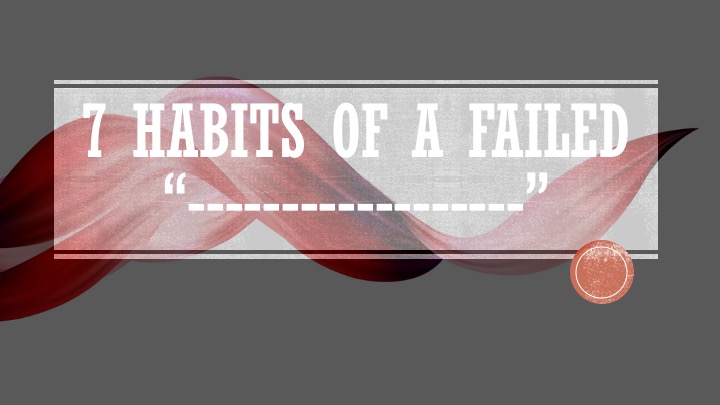7 Habits of a failed Sound Engineer
A couple of years ago while I was undertaking my Masters, I remember taking this business course and my professor told us about the seven habits of a failed CEO. Before long I came to realise that these habits actually cut across a lot of disciplines; I have tried to apply it to so many areas of my life, especially as a Sound Engineer.
In my years of experience I have come to see a lot of successful Sound Engineers disappear all of a sudden from the scene. It is therefore imperative, that we all work towards extending our careers as much as we can. So I’m going to share with you, seven habits of a failed Sound Engineer.
1. They see themselves as dominating their environment. They believe they are the best at what they do and that they are indispensable. The question is, is it important to be the best at what you do? Absolutely yes, but the moment you see yourself as being the best you restrict yourself from improving and underestimate the fact that failure is just one show away. It’s also very easy that to get carried away by external praisers, I’ve seen so many sound engineers fall foul to this act of pre-eminence. The truth is you might be on top today but habits like this can lead to long-term failure. One of the signs of this is when Sound Engineer begins to show lack of respect to his peers. If you have a friend who is exhibiting this trait, try your possible best to call him or her to order. A stitch in time saves nine.
2. The second habit is when a Sound Engineer completely identifies them selves with the artist they are working with while showing no clear boundaries between their own personal interests and the artist or band‘s interests. This might come across as controversial, however, it is imperative to understand that your career and that of your artist/band are two independent entities. Most times bands or artists’ career can be seasonal; they tend to come and go. In-as-much as it is important to grow with the band that’s aiming for the top it’s also important in any business or an individual to have what you call an exit strategy. Never let your improvement be dependent on the improvement of your band or artist. I personally believe that sound engineers should be fully committed to the vision of the band or artist but not to the extent of forgetting their own vision. (Also your personal ambition should not be dependent or interwoven with the ambition of the band or artist.) A warning sign is when a Sound Engineer loses interest in discovering or working with any other band or artist.
3. They think they have all the answers. It’s funny that our job entails using our ears mainly. The moment a sound engineer stops listening he or she is headed for failure. When I mean listening, not to the music, but to the voice of reasoning. No man is an Island, neither can you see yourself. The people around you tend to know you best. People who need to have all the answers shut out other points of view. This could lead to alienation from your team, all of sudden, you start being omitted from team and productions meeting (this is a warning sign by the way), the team would rather avoid having to face a confrontation with you. Even when you are allowed to make a decision, they would be praying you are making the right decision. When your perspective and the management team's perspective begin to drastically differ, take note. Do not be a leader without followers.
4. They ruthlessly eliminate anyone who isn't completely behind them. You complain about the backline tech, about the system engineer, the patching engineer, the tour manager, the production company, everyone is wrong but you. The problem with this approach is that it's both unnecessary and destructive. You don't need to have everyone unanimously endorse your vision or work to have it carried out successfully. In fact, by eliminating all dissenting and contrasting viewpoints, you cut yourself off from your best chance of seeing and correcting problems as they arise. A powerful warming sign is when people begin to depart the team because of you, at some point the roles will be reversed and you will be the one to depart from the team.
5. They are consummate spokespersons and have excuses for every issue or failure. This has two sides to it, Sound engineers who are so focused on their image tend to never accept fault for failures. No matter how long you have been in the industry, you will have experienced one or two bad days. If you’ve experienced none, you are probably not experienced enough (pun intended). When you focus more on your image than getting the job done, you are heading downhill fast, especially with the instagram generation. Sound Engineers who spend more time on taking pictures rather than correcting, troubleshooting and or mixing a show become self indulging, belligerent and attention-seeking individuals.
6. They underestimate obstacles. When sound engineers become so enamoured of their vision, they often overlook or underestimate the difficulty of actually getting there. And when it turns out that the obstacles they casually waved aside are more troublesome than they anticipated, they have a habit of plunging full-steam into the abyss. It is very difficult to sometimes as a human admit that you’ve made the wrong call, there will always be people who would say you weren’t up to the job. However, the quicker you are able to perform a u-turn and salvage your integrity, the better for you and your team, most importantly for you. In life, you win some and loose some. You need to sometimes count your loses quickly and reassess and re-evaluate your position. Excessive hype from your team is a warning sign and also a pre-requisite for ignoring obstacles, but when you remember the same people who shouted Hosanna yesterday could be the same ones crying “crucify him!” tomorrow.
7. Finally, they stubbornly rely on what worked for them in the past. A lot of Sound engineers on their way to becoming spectacularly unsuccessful accelerate their decline by reverting to what they regard as tried-and-true methods. In their desire to make the most of what they regard as their core strengths, they cling to a static mixing style. They fail to consider innovations in areas other than those that made them successful in the past. Instead of considering a range of options that fit new circumstances, they use their own careers as the only point of reference and do the things that made them successful in the past. A warning sign is when an Engineer constantly keeps referring to what worked in the past. Most Engineers who fall prey to this habit owe their careers to some "defining moment," a critical decision, choice or time and chance that resulted in their most notable success. They continually use the same model or repeatedly make the same decision, despite its inappropriateness, and usually leads to significant failure.
These seven habits are powerful reminders of how we are not only instruments of growth and success, but sometimes also our own architects of failure. That each of the habits has elements that are valuable for sound engineers only serves to point out how vigilant people who enter an industry leader's orbit must be, whether they are other team members and or competitors. In small doses, each of the habits can be part of a winning formula, but when people overdose on power and fame, the habits can quickly become toxic. That is a lesson everyone should take to heart.

